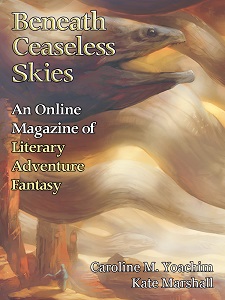 Beneath Ceaseless Skies #177, July 9, 2015
Beneath Ceaseless Skies #177, July 9, 2015
Reviewed by Joshua Berlow
“Seasons Set in Skin” by Caroline M. Yoachim is a competent, enjoyable tale set in Japan. The author has substituted the historical coming of Westerners to Japan with the coming of the fae. These faery folk are warlike and have been battling the indigenous Japanese for at least a couple of generations. This twist on historical fact is a clever set-up.
More innovations keep the tale interesting. The protagonist is Horimachi, whose job it is to tattoo human soldiers with faery blood. These tattoos are supposed to be protective in battle, yet there’s a question as to how effective they really are.
The human battle against the fae is an heroic, yet lost cause—the faeries are winning. The faeries have one important unbeatable tactic—they are able to bring back the fallen dead human soldiers as puppet zombies! Although the word “zombie” is never mentioned in “Seasons Set in Skin,” that’s what they are.
What’s not to like in “Seasons Set in Skin”? There are tattoos of faerie blood, the allure of pre-modern Japan, and zombies! This is a cleverly-crafted tale which will keep you interested.
I wish I could say I liked the second story “Stone Prayers” by Kate Marshall, as much as the first tale. There is a thematic continuity with the first story insofar as there is a war, and the protagonists are female. However I found “Stone Prayers” hard going. I admire its stylistic complexity and poetic flair, but ultimately I was just confused.
There’s a complicated backstory in “Stone Prayers,” but we’re dropped directly into this world without any explanatory exposition. As a result, I had trouble understanding what was going on and lost interest. I tried numerous times to piece it all together but eventually had to resign myself to the fact that I would never figure it out. Perhaps this is supposed to add mystery but I found it confusing. There’s an array of people, places, religions and languages with unusual names that are difficult to keep straight. The Kirondi, the Hasha, and the Enokoans are involved in a war but I was never quite sure who was who and what the war was about.
The prose is poetic and assured, and on this basis I can see why the editor chose to publish “Stone Prayers.” However, the competent prose doesn’t make up for the fact that it’s difficult to follow. There’s enough backstory here for a novel, and I wonder if this is a novel excerpt. “Stone Prayers” has too much going on all at once for a short story.
Joshua Berlow wants to be your friend on Facebook.